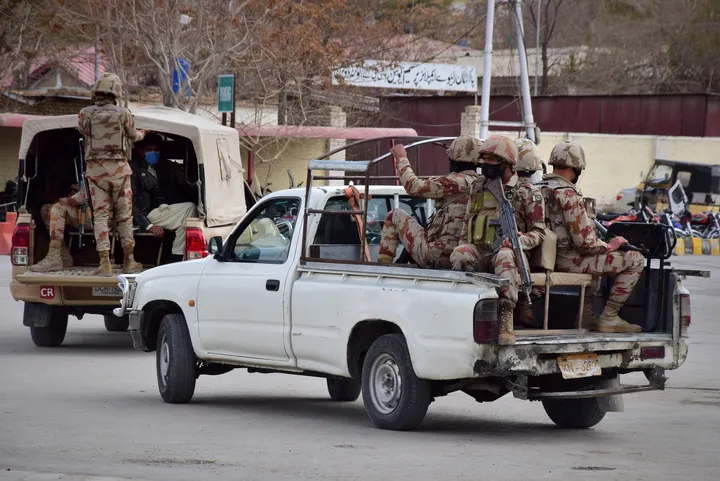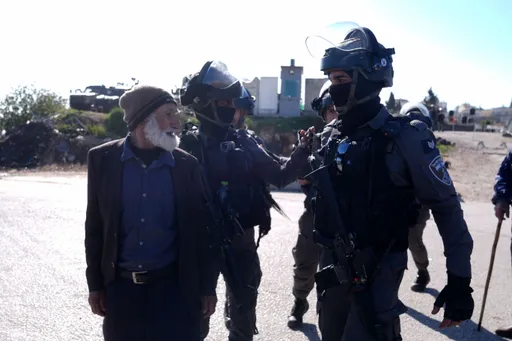It's a late weekday morning in Berlin, the city is just slowly opening up after the coronavirus lockdown. Working out of a dilapidated office block in the centre of the city, Rosalina Jecht, or Ling, is on the morning shift, busy preparing bags of food which will soon be on their way.
It's a mad dash, lots of shouting and waving – an alchemy of organised chaos.
The fresh bread is still on its way, the soup's ready and is being poured into cups – her job is quality control. At Karuna, the idea is, everyone should be afforded the same dignity and respect.
Karuna is a charity, that looks after Berlin's homeless and vulnerable youth. During the lockdown, they observed a spike in homelessness, with scores going days without food as many previously relied only on the goodwill of Berliners.
There are no official figures for homelessness in Germany, but estimates from charities suggest slightly over 850,000 people in the country were homeless last year.
Save the Children, an international charity focused on the welfare of children, saw a spike in cases of vulnerable children affected by drug abuse, physical abuse at home and mental health issues.
To provide critical support to homeless adults and children, Karuna and Save the Children came together to fund a special 'Youth Force' to provide at least one hot meal a day to many of the city's homeless who in many cases were starving, while suffering from mental health issues and drug addiction. This brief social interaction with those who brought them food was a psychological lifeline.
'Youth force'
Karuna's head Joerg Richert says the situation for homeless people "definitely got worse" due to the lockdown. He says new groups that had previously gone unnoticed, started appearing on the streets, for example, ex-prisoners.
"Due to our work, we actually have a very good system for the re-integration of ex-prisoners here in Germany, but all the counselling centres had closed so many of the ex-prisoners were left without a home and without any prospects," says Reichert.
He adds that young people living in precarious conditions took on more stress at home when confined to their apartments and that "they simply ran away" making them dependent on food and drink handouts.
Ling, 21, joined the team during the pandemic lockdown. Her friend was already employed by Karuna, and Ling saw this as an opportunity to give something back.
Ling's story isn't typical to Berlin or Germany, but it highlights some of Germany's darkest problems: racism, bullying, and socio-economic marginalisation.
"I was fourteen when I ran away from home, never really had a good time at school, my mother is from the Philippines and my father is German, so being of mixed racial heritage I often got severely bullied at school," Ling recalls.
Her mother worked long hours in her restaurant, and an exaggerated age gap between the parents meant her father retired to a care home early in Ling's teenage years, meaning that the little psychological and familial support she received at home all but came to an end.
"When I ran away, I dropped out of the school system, my mother was worried, but I didn't know what to do, I just didn't want to take the racism and the bullying anymore," says Ling, with a weary look on her face.
She adds, "it was a three year long fight, I suffered from anxiety, depression, and was almost placed on suicide watch."
Ling managed to turn her life around but with little help from the government; it was her friends, family, a new relationship, and soon a daughter who would motivate her.
Cracks in the system
Germany is a proud welfare state, but often that pride comes into question by those like Ling, who fall through the cracks and get lost to the urban jungle.
In a country where playing hookey from school can bring severe fines or even short jail sentences for the parents, how do vulnerable children like Ling fall through the cracks?
In some cases, teenagers want to disappear from the system because they fear institutionalisation aimed at protecting them from drug addiction or physical and sexual abuse. The facilities are a crude form of a rehabilitation centre meant to protect young people from the harm they could might themselves.
Save the Children Germany CEO Susanna Kruger says, "once they disappear from school, from home and from organisations meant to help them, it's very difficult for the state to locate them."
The government's already under severe pressure – at the children's welfare ministry, each counsellor is responsible for 85 vulnerable families, according to Susanna Kruger.
If the state cannot track these children, it cannot allocate resources for them.
Susanna says, "corona shone a spotlight on everything that did not work, and now it's expected to get worse."
According to Joerg, during the lockdown, 80 percent of children remained stable with their education, social life, mental and physical health while 15 percent faced some or severe difficulties due to complicated family arrangements, inaccessibility to online education, and loss of contact with mental health givers. Five percent of children faced an existential crisis.
'Pride' under pressure
Germany's economic projections for 2020 are bleak. The European Union's projections? Even worse. The economic bloc is looking at rates of unemployment not seen since the end of World War II.
According to the German Institute for Economic Research, commonly known as DIW, Germany's GDP is set to shrink by almost 10 percent by the end of this year. And there is no real hope of a major recovery even by the end of 2021.
A survey of over 400 retail businesses across Germany by the German Retail Federation suggests nearly 80 percent of retailers are pessimistic about the future, and they're anticipating a wave of insolvencies in the retail sector resulting from the crisis.
Germany will borrow nearly 220 billion euros ($248 billion) this year, a German record.
But in a country already suffering from slow upward mobility, how much of this borrowing will trickle down to those at the lowest rung of the socio-economic ladder?
Joerg from Karuna reckons that the number of homeless people in Germany will climb even more due to the economic situation. He also expects a large influx of people from Eastern Europe, who will look to earn in big cities like Berlin by selling street magazines or begging and then transfer it home, because the situation there is far worse.
Governmental and non-governmental support groups are already under serious pressure. The Karuna project itself is funded through public and corporate donations as well as grants from the Berlin city government.
The Karuna and Save the Children project is looking at novel ways to support Berlin's forgotten underbelly. They're looking to extend the current project and look towards bringing as many vulnerable adults and youth under the scheme to canvas the government and the public for support.
One of the schemes under discussion is to set up smaller satellite locations across the city to easily enable people to reach out to them for hot meals, used clothes and a space for social gathering.
For those like Ling, it's an opportunity to give back to society, and for her daughter, Raven, it's a chance to absorb empathy and humanity.
"It's nice to come here and help those who are in a similar position to where I was, sometimes I come across people, in their faces and in their stories, sometimes I can see a bit of myself," says Ling.























